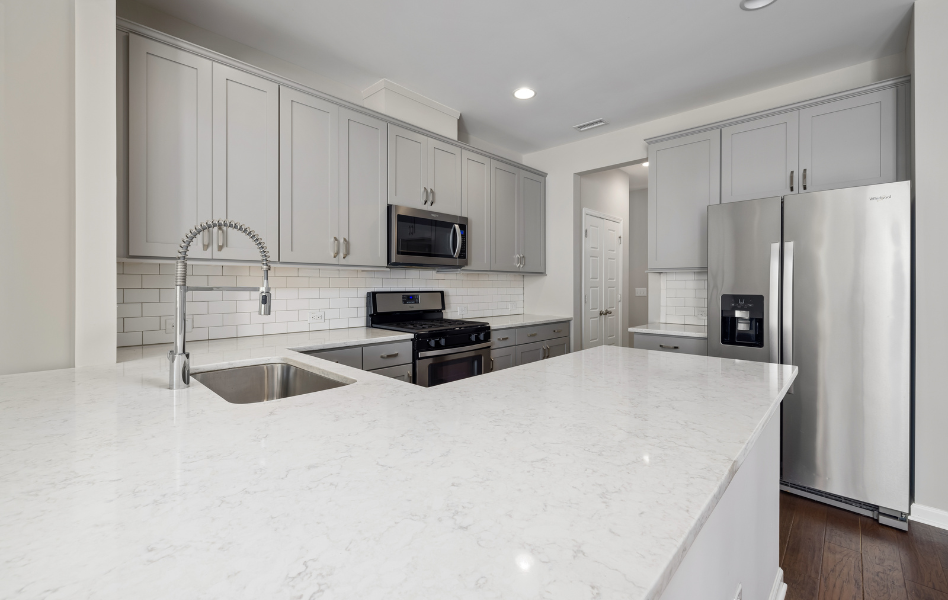
Quartz vs marble countertops: which is better?
Choosing the perfect worktop for your kitchen or bathroom is a significant decision. Among the most popular options in the UK are quartz and marble countertops, each offering unique advantages in terms of appearance, durability, and maintenance. While marble is known for its timeless, natural beauty, quartz provides a modern, uniform look with impressive performance qualities.
In this blog, we provide a detailed comparison to help you make an informed decision.
What is Quartz?

Quartz worktops are engineered stone surfaces made from approximately 90-95% natural quartz crystals mixed with resins and pigments. This manufacturing process allows for a vast range of colours and patterns, many of which replicate the look of natural stone.
Quartz is non-porous, highly durable, and resistant to staining. It has become a preferred choice for many UK homeowners seeking a low-maintenance and contemporary alternative to natural stone.
Key features:
- Engineered using quartz crystals and polymer resins
- Available in a wide variety of colours and finishes
- Extremely durable and scratch-resistant
- Non-porous surface eliminates the need for sealing
What is Marble?
Marble is a natural metamorphic rock formed over thousands of years under heat and pressure. It is prized for its luxurious aesthetic, unique veining, and classical appeal. Each slab of marble is one-of-a-kind, making it a favourite among homeowners looking for a bespoke finish.
However, marble is a softer and more porous stone compared to quartz. It requires regular sealing and is more susceptible to scratches, stains, and etching from acidic substances.
Key features:
- 100% natural stone with elegant veining
- Cool to the touch, ideal for baking surfaces
- Available in classic tones like Carrara, Calacatta, and Statuario
- Requires sealing and ongoing maintenance
Quartz vs Marble
| Feature | Quartz | Marble |
| Composition | Engineered stone | Natural stone |
| Appearance | Uniform, varied designs | Unique veining, classic look |
| Durability | Highly durable, scratch- and stain-resistant | Softer, more prone to damage |
| Maintenance | Low; no sealing needed | High; regular sealing required |
| Porosity | Non-porous | Porous |
| Cost | Generally more affordable | Can be expensive depending on type |
| Heat Resistance | Moderate | High, but can stain or etch |
Pros and cons of quartz countertops
Pros:
- Extremely hard and durable
- Stain-resistant and non-porous
- Wide variety of styles and colours
- Consistent appearance across slabs
- Easy to clean with mild soap and water
Cons:
- Not as heat-resistant as marble
- May appear less ‘natural’ to some homeowners
- Can discolour over time when exposed to direct sunlight
Pros and cons of marble countertops
Pros:
- Naturally beautiful with unmatched veining
- Enhances property value with a luxurious finish
- Remains cool, ideal for baking and pastry preparation
- Each slab is unique
Cons:
- Prone to staining and etching from acidic spills
- Requires regular sealing and maintenance
- Susceptible to scratches and chipping
- Can be costly to repair or replace
Which is better for your home?
The choice between quartz and marble largely depends on your lifestyle, design preferences, and maintenance expectations.
- Choose Quartz if you prioritise durability, low maintenance, and a wide range of design options. It’s ideal for busy households or rental properties.
- Choose Marble if you’re looking for a timeless, high-end finish and are willing to invest time and care into its upkeep. It suits classic and luxury interiors where the worktop is a focal point.
Sustainability & environmental impact
Quartz production involves mining and manufacturing, which consumes energy, but many brands now offer eco-friendly options using recycled materials and sustainable practices.
Marble is a natural product, but quarrying and transporting it can have a significant environmental footprint. Additionally, due to its high maintenance and shorter lifespan under heavy use, it may require more frequent replacement.
When sustainability is a priority, quartz may offer a more eco-conscious choice if sourced from responsible manufacturers.
Expert recommendation: worktop warehouse’s view
At Worktop Warehouse, we understand that every home and customer is different. Our experience shows that quartz worktops are a preferred choice for most UK homeowners due to their practicality and low maintenance.
However, for clients seeking an elegant, bespoke aesthetic and are willing to care for their surfaces, marble remains a classic and luxurious choice. We recommend visiting our showroom to explore both materials in person, where our design consultants can guide you based on your lifestyle, budget, and interior style.
Conclusion
Both quartz and marble countertops have their distinct advantages and limitations. Quartz excels in functionality and versatility, while marble stands out for its natural beauty and elegance. The best choice comes down to how you intend to use the space and the level of maintenance you’re comfortable with.
At Worktop Warehouse, we offer an extensive selection of both quartz and marble surfaces. Contact us today or visit our UK showroom to speak with an expert and find the perfect worktop for your home.
Looking for expert advice or custom worktop solutions?
Contact our team today to explore a wide range of outdoor kitchen worktops that are built to last and designed to impress. Or get a quick quote through our online quote form here.
